Beekeeping crash course
I am pretty much fascinated by pollinators, not just honeybees, but moths, wasps and the big bumblebees that get drunk on nectar, sitting immobilized on a swaying branch of flowering basil. For many years I have wanted to get involved with beekeeping simply because I want to watch the bees go about their routines.
My first brush with a beekeeper came last year when Kristin bought her car from a guy who kept bees in his backyard. He also happened to be the Star News reporter who took a picture of me in front of a biodiesel tanker. Half a year later at another photo shoot I asked about checking out his bees. Unfortunately I never got to connect much further than that initial question about the hives.
A few months ago some friends let me know that they knew folks who kept bees and also lived in my neighborhood. They each gave me the beekeepers’ contact information and left me to it.
I don’t usually hesitate when contacting strangers, but in this instance I was paralyzed for some reason. I was about to actually get involved with something that I had talked about for several years. Critical mass… I had a phone number and an email address, so, after a few weeks of deliberating, I sent off an email. Sporadic correspondence came and went, and I finally met up with the beekeepers at a friends wedding. I had plenty of questions for them, and it seemed like we talked about bees for quite a while. We left the wedding with promises of going to check out the hives in the next few weeks and to sit down and discuss equipment.
They called the next morning… That afternoon I was riding in their car out to the hives. They brought along an extra bee suit so I was able to get up close when they inspected the hives. Through the process of opening the hive I was able to see all the parts I had been reading about in various beekeeping books. I finally understood what I was reading, and it all started to make some sense.
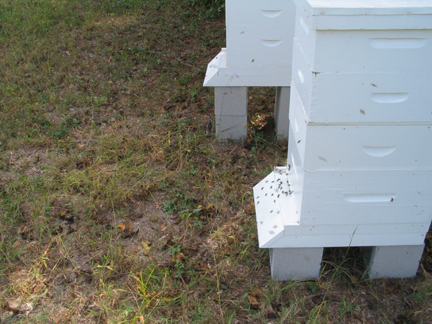
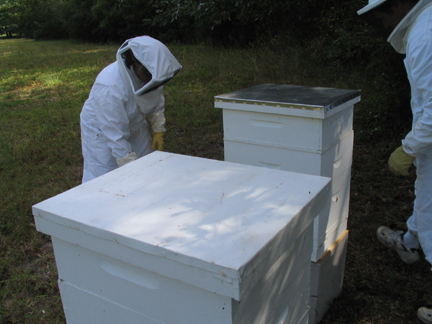
The keepers were looking for signs of wax moths, a hive pest that can destroy a weakened hive in a very short time frame. The beekeepers were also winterizing the hives, adding food and removing supers that did not have much comb and honey buildup.
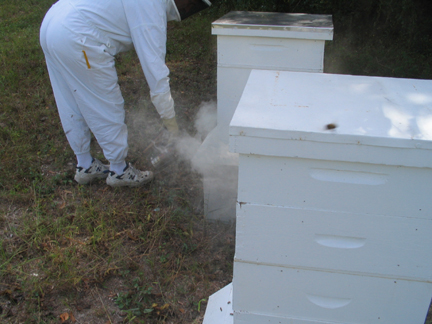
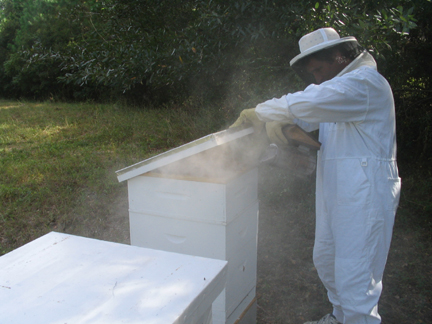
The process of opening the hive starts with smoking the entrance and the top of the hive. This induces the bees to gorge themselves on honey, making them too heavy to move quickly and less likely to get rapidly agitated.
Next they removed the super, which holds ten frames on which the bees build a comb and insert honey or brood.
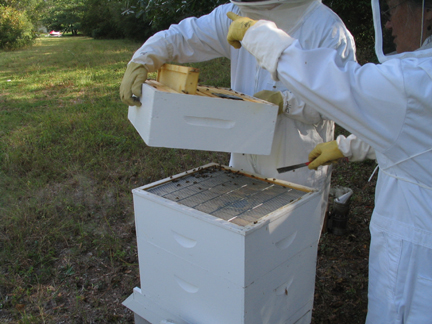
The wire grate is the queen excluder which prevents the queen from entering the upper parts of the hive. This prevents her from laying eggs in that part, which gives the beekeeper access to the extra stored honey.
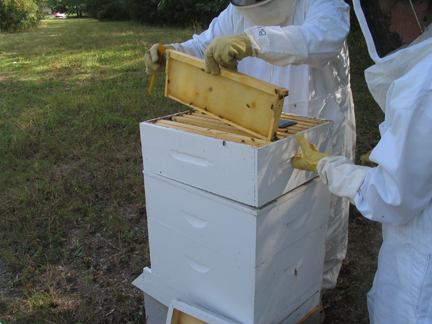
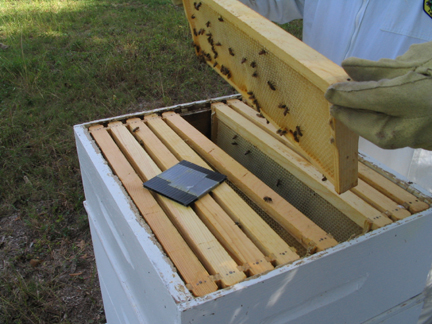
Another insect problem that the hives fight is the small hive beetle, a recently introduced pest that can also cause bees to abandon the hive. Small beetle traps are placed in the hive to keep the beetle in check. The trap is the black square in the above picture.
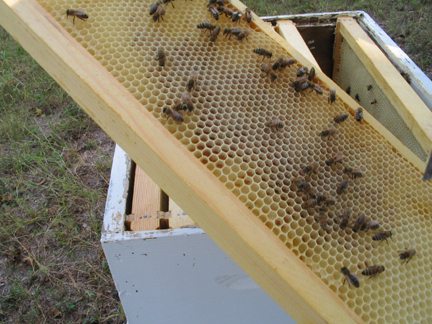
After they put the hives back together, confident that the bees were healthy and ready for the winter, my head was full and a bit overwhelmed. I feel confident that I can take on beekeeping, and I look forward to learning more of the hands on details of working with these awesome creatures.
October 24, 2007 at 9:22 pm
Awesome! I was just thinking about bees while eating some honey I got from Honeybell Farm. They’re lovely, useful creatures – unlike mosquitos.
October 24, 2007 at 9:25 pm
Even if I never harvested honey, I would like to have a hive around.
We have some Honeybell Farm honey in the cupboard, the dark stuff. Have you tried the duck eggs he sells?
October 24, 2007 at 9:56 pm
I’ve had a few family members that have done some beekeeping. It’s a heck of a hobby that pays off nicely.
October 25, 2007 at 7:54 pm
We’ve got the dark honey too – on your recommendation, I think. I can’t get enough of it. I mix a little bit of it with the Carolina Peanuts peanut butter and spread it on toast for breakfast. Yum. I haven’t tried the duck eggs yet…I guess there’s no reason not to!
October 25, 2007 at 8:21 pm
I’ll have to check out that peanut butter…
Sean – how many hives did your family keep?
October 25, 2007 at 9:12 pm
Trace- not sure exactly, but your photos look about right. I had a step-grandpa raised bees and made his own beer(what a guy). I also have a distant relative in Alaska that raises them too, although he said this last year was pretty rough for it. I’m no expert and only enjoy the benefits of honey and not the expertise of raising.